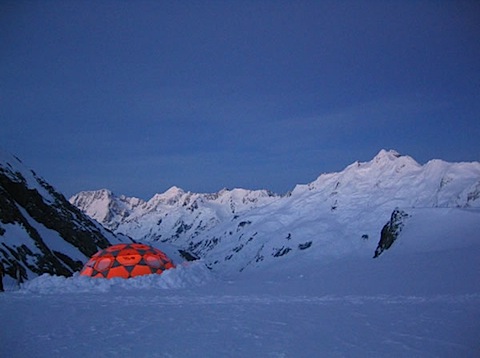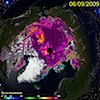
There are chilly weeks ahead for a team of six scientists — two New Zealanders, two Chinese and and two from the USA — who are heading into the Southern Alps around Mt Cook for a winter ice core drilling project organised by GNS Science. Winter drilling is necessary to avoid the cores melting on extraction — daytime temperatures will be around freezing, but could drop to -20ºC at night. Julian Thomson (blog — worth a read) of GNS explains how they will select sites:
“Ideal ice core sites are flat, at high altitude, with a slow-moving glacier and moderate snow accumulation. These sites enable good preservation of a long continuous record of annual ice core layers,†he said. “Such sites are rare in the Southern Alps where the highest areas are typically steep and with very high snow accumulation rates. New Zealand glaciers are therefore fast moving and dynamic.†Weather permitting, the scientists plan to retrieve ice cores from several sites.with altitudes ranging from 2200m to 3000m.
The logistics are a challenge:
The cores will be brought to the surface in 1m lengths, bagged in clear polythene and stored in purpose-built insulated boxes. Typically, it can take up to 12 hours to retrieve 50m of core from a site. The ice cores will be air-lifted off the glacier and taken to Mt Cook Village and stored in a walk-in freezer at The Hermitage Hotel. From there they will be taken in a refrigerated truck to the New Zealand Ice Core Research Laboratory at GNS Science in Lower Hutt.
Retrieving the climate records in the cores is becoming urgent because NZ’s glaciers have lost 60% of their volume since the 1850s. The Press coverage quotes Thomson:
“There is definitely a feeling that these glaciers are not going to come back for a good while. It is a priority to get the ice cores out as soon as we can,” Thomson said. “We’re not sure how old the ice is at the bottom. If we’re really lucky, we hope to go back a few hundred years. “That takes us back further than instrument weather stations, which have been around for about 150 years. If we went back into the thousands of years we’d be absolutely gobsmacked.”
We have to hope that the staff at The Hermitage resist the temptation to serve the ice with whiskey at the bar…
[Update: RNZ National’s Jim Mora interviewed Julian Thomson this afternoon: audio here at 14:10.]
[Iron & Wine]
Like this:
Like Loading...




You must be logged in to post a comment.